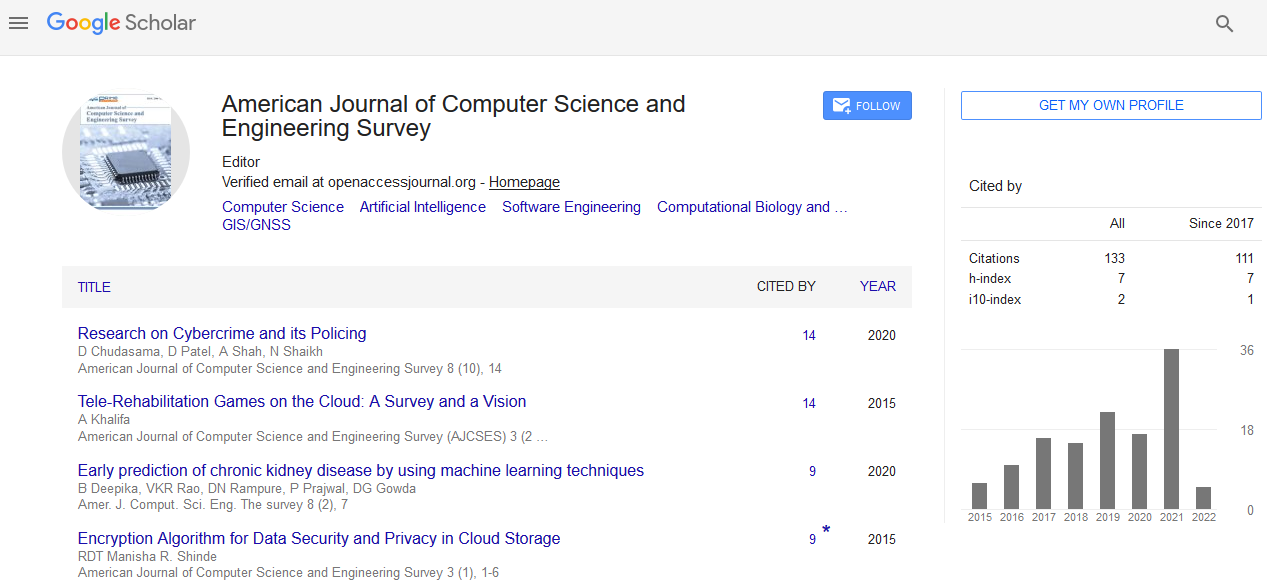Perspective - (2023) Volume 11, Issue 2
A Weighting Method Based on the Improved Hesitation of Pythagorean Fuzzy Sets
Fatima Al-Saud*
Department of Computer Science, Effat University, Saudi Arabia
*Correspondence:
Fatima Al-Saud,
Department of Computer Science, Effat University,
Saudi Arabia,
Email:
Received: 31-May-2023, Manuscript No. ipacses-23-17193;
Editor assigned: 02-Jun-2023, Pre QC No. ipacses-23-17193 (PQ);
Reviewed: 16-Jun-2023, QC No. ipacses-23-17193;
Revised: 21-Jun-2023, Manuscript No. ipacses-23-17193 (R);
Published:
28-Jun-2023, DOI: 10.36846/2349-7238.23.11.20
Introduction
The current master weight assurance technique for multi-trait
dynamic in light of the Pythagorean fluffy number methodology
doesn’t utilize the faltering associated with the choice data,
which might cause one-sided weight task. In this manner, to
resolve the issue of obscure master loads and trait assessment
in view of Pythagorean fluffy numbers in multi-characteristic
cooperative choice making issues, a weight assurance strategy
is suggested that works on the treatment of faltering in Pythagorean
fluffy sets. The vicinity of specialists and likeness of the
adjusted ones, right off the, still up in the air as per the assessment
network. Then, the master loads are incorporated from
the parts of nearness and remedied comparability to acquire a
gathered complete assessment framework.
Description
At last, the options are positioned utilizing strategies. The
consequences of master weight examination and information
confirmation exhibit that the proposed strategy completely
uses master dynamic data, prompting a critical improvement
in the soundness and exactness of multi-property cooperative
choice making issues. Multi-standards collective choice making
(MCGDM) is a part of tasks research that is broadly utilized in
dynamic cycles to decide the ideal arrangement by assessing
elective choices across numerous clashing measures. In MCGDM,
the loads relegated to specialists assume a urgent part,
especially during the information conglomeration stage. Different
master loads can bring about fluctuating assessment results
from a similar individual choice network. Abstract assurance
of master loads can think twice about meticulousness and
scientificity of independent direction. To address this, different
strategies have been created for equitably deciding master
loads. These strategies can be arranged into two classifications:
Techniques for deciding the loads of individual specialists and
gathering specialists, and techniques for deciding the loads of
individual specialists according to different specialists. Therefore,
a few strategies have been created to decide master loads
unbiasedly. These strategies can be characterized into two classifications:
Techniques for deciding loads of individual specialists
and gathering specialists, and techniques for deciding the
loads of individual specialists comparable to different specialists.
Strategy for working out the loads of individual specialists
and different specialists: This class straightforwardly evaluates
and decides the loads by thinking about the vicinity or likeness
between every individual master and different specialists. The
size of the distance to ascertain the master weight, first tracking
down the distance between every master and different specialists;
the bigger the distance, the more modest the master
weight, and going against the norm, assuming the distance is
more modest, the master weight is bigger. The more noteworthy
the weight, and the more modest the closeness, the more
modest the weight.
Conclusion
Compute the heaviness of specialists based on deciding the
comparability among specialists and different specialists. In
the two previously mentioned sorts of weight estimation techniques,
the connection between individual specialists and gathering
specialists or between individual specialists and different
specialists is thought of, prompting specific impediments in
the computation of master loads. To address these limits, this
paper proposes a complete methodology that coordinates the
two strategies and considers the relationship among specialists.
Thusly, it tries not to allocate outrageous loads to individual
specialists and changes the significance proportion of the
two techniques in view of explicit necessities. This approach
improves the scientificity and levelheadedness of the ensuing
positioning outcomes.
Citation: Al-Saud F (2023) A Weighting Method Based on the Improved Hesitation of Pythagorean Fuzzy Sets. Am J Comp Science.
11:20.
Copyright: © 2023 Al-Saud F. This is an open-access article distributed under the terms of the Creative Commons Attribution License, which permits unrestricted use, distribution, and reproduction in any medium, provided the original author and source are credited.

